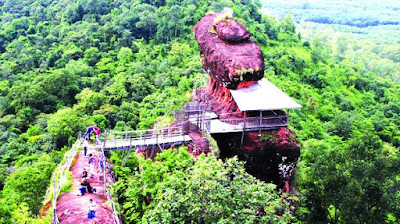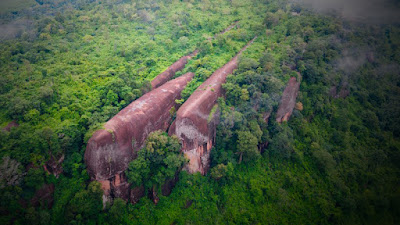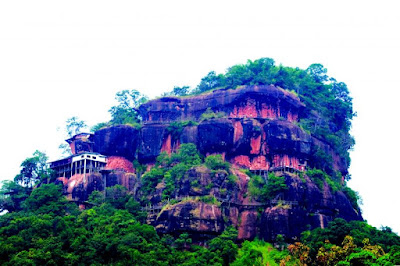.
Upgraded from district to a province in 2011,
Bueng Kan in Thailand’s northeast is a popular tourism destination
thanks to its historical and archaeological sites as well as its
celebration of Songkran, the Thai New year, the Rocket Festival and
long-boat racing. It’s not short on natural attractions either, among
them Phu Wua Wildlife Sanctuary, the Chet Si, Tad Kinari and Tad
Wimanthip waterfalls, Bueng Khong Long and Phu Tok.
Visitors can also enjoy a taste of Laos in the
area where the Mekong River meets our northeastern neighbour’s
Borikhamsai District and where another Friendship Bridge will soon be
built.
A must-see is Three Rocks Whale or Hin Sam Wan in Thai. Located in a
conservation area in the national reserve covering the Kala rainforest,
Phu Sing forest and Pink Dong forest, it is made up of three rocks
perched on the mountain that are thought to date back some 75 million
years. The rocks bear a remarkable resemblance to a family of whales –
father, mother and baby – and offer one of the most beautiful viewpoints
in Phu Sing.
Nearby is the equally impressive Phu Sing rock, the result of a
geological change in the earth’s crust and a place of immense natural
beauty. Phu Sing has important natural features including the Phu Sing
Tham Field, the Lan Tham Viewpoint, Ruesi Cave, Hin Chang, Hin Railway,
Lan Hin Lai and Phu Sing Rock Wall.
.
.
The high and isolated Phu Thok in Na Sabaeng subdistrict is where you’ll
find Wat Chetiya Kiri Wihan or Wat Phu Thok as it is known locally and
from here, it’s possible to see the mountains in Nakhon Phanom. Years of
manual labour went into the building of a 7-storey spiral staircase
which leads to the cloisters and cave. From the top, tourists can see
the beauty of the landscape below. The highlight of Phu Thok is the
Buddhist temple, which contains the Buddha's relics. It is considered a
magical place because when a stone separated from a larger stone, it did
not tumble down the hillside and is often likened to Golden Rock Pagoda
in Myanmar. Phu Thok doesn’t normally allow visitors but is open to all
comers between April 10 to 16 every year. Another must-see is Phu Lanka
National Park, a massive area that stretches from Phai Lom Subdistrict
in Nakhon Phanom to Bueng Kan’s Seka District.
.
.
The best time to visit is from May to October when the wildflowers, wild
orchids and paphiopedilum are in full bloom at the top of Phu Lanka.
Tourists can also explore the nature trail, waterfalls and the Pha Sanga
Buddha Cave. Those wishing to climb to the top of Phu Lanka to admire
either sunrise or sunset should contact the park’s staff at least 7 days
in advance.
And if you are planning to visit, be prepared for lots of long walks and steep climbs. They are worth every minute of the views you’ll experience.
Source - The Nation
And if you are planning to visit, be prepared for lots of long walks and steep climbs. They are worth every minute of the views you’ll experience.
Source - The Nation


